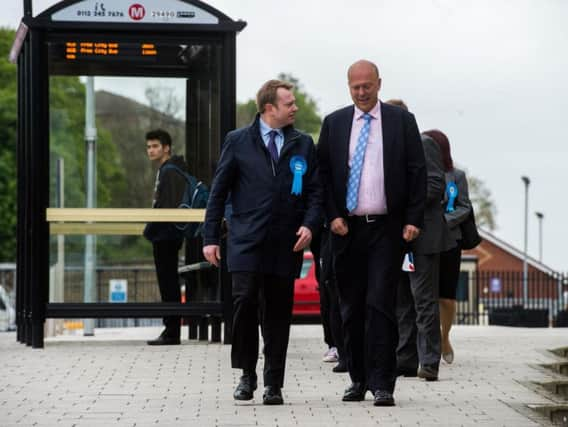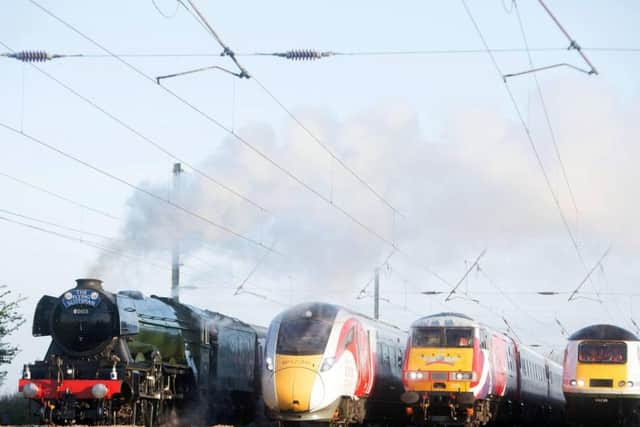Under-fire Transport Secretary Chris Grayling comes out fighting on Northern transport spending


Starting with his decision to scrap electrification of a stretch of the Midland Mainline and ending with his supportive comments about a second Crossrail project in London, Transport
Secretary Chris Grayling became the target of sustained attacks from think-tanks, business groups, politicians and the media in the North.The storm culminated in a summit in Leeds demanding the Government recommit to transport improvements in the North including clear timetables for delivery.
Advertisement
Hide AdAdvertisement
Hide AdYesterday, Mr Grayling travelled to Manchester and Leeds to deliver his response. “I’m well aware there’s lots to do, but actually I’m pretty proud of the things that are happening now and some of the things that have been said about future plans are just not right,” he told The Yorkshire Post.


Mr Grayling argued his support for Crossrail 2 in the capital was overstated.
“The issue with Crossrail 2 is that in the same way that Crossrail 1 was funded, London needs to make a substantial contribution to it. A lot of the money for Crossrail 1 came from London.
“We are nowhere near the point yet where London has actually been able to come up with sufficient funding to make the project happen.”
Advertisement
Hide AdAdvertisement
Hide AdHe also defended the decision to scrap plans to electrify the stretch of the Midland Mainline between Nottingham and Sheffield, an announcement that came just days before he apparently expressed support for Crossrail 2.


“We are about to embark on the biggest modernisation programme of the Midland Mainline since the 1870s. Over the next four years we are straightening tracks, putting new signalling in, additional line capacity, electrification, new trains. That will, by around 2020, take around 20 minutes off the journey time between London and Sheffield.
“I could then finish the electrification of every inch of the route, that will cost nearly £1bn more and save one extra minute on the journey time to Sheffield.”
Mr Grayling said the use of bi-mode trains, which can run on diesel or electric, could deliver the same benefits as full electrification on the route.
Advertisement
Hide AdAdvertisement
Hide Ad“What matters to the passengers is the journey time, the comfortable train, not how the train is powered,” he said.
But despite extolling the virtues of bi-mode trains, he insisted no final decision had been taken on whether the complete electrification of the trans-Pennine route will go-ahead.
“I haven’t announced any changes at all. I haven’t got on my desk yet the Network Rail plans for that route. There’s a £3bn investment plan that’s going ahead.”
He continued: “What I have said is that the arrival of bi-mode technology means you have options you didn’t have before.“For example is it really logical to close the Standedge Tunnel for six weeks if the same trains you are using on that route can travel through the same tunnel without that happening?
Advertisement
Hide AdAdvertisement
Hide Ad“It doesn’t mean you don’t electrify the rest of the route but it does mean if you get a complicated piece you don’t need to. The reason it’s better to have bi-mode trains on that route means, for example, you can keep modern trains running from Scarborough to Manchester Airport.
“Nobody is planning to electrify to Scarborough at the moment.
“A hybrid train can go on electric mode when there’s electric tracks and carry on under its own power.
“There is no restriction, if a line’s electric or diesel the same train can run.”
Advertisement
Hide AdAdvertisement
Hide AdThe last major storm to engulf the Government over rail plans came when, just weeks after the 2015 General Election, the trans-Pennine and Midland Mainline projects were put on hold as their timetables were reviewed.
Mr Grayling’s announcement of the decision not to electrify the Midland Mainline came shortly after June’s General Election but the minister insisted voters had not been deceived.
“What I want people to start thinking about is what are we trying to achieve for the passenger? We get very caught up in infrastructure and systems. We don’t actually think about what we are trying to achieve.
“What we are trying to achieve is big modernisation programmes that introduce better journey times and nice new trains and that’s what we are doing.”
Advertisement
Hide AdAdvertisement
Hide AdThen chancellor George Osborne promised the Government would deliver a trans-Pennine high speed rail service dubbed Northern Powerhouse Rail or HS3 offering a 30-minute journey time between Leeds, Manchester and Sheffield.
The current administration has continued that pledge and the summer has seen calls for Mr Grayling to set out a clear timetable and budget for the project.
He said: “Northern Powerhouse Rail is in our manifesto so it is a project we are committed to.
“What we need to establish is exactly what Northern Powerhouse Rail is. It is not the same as HS2 because it is east-west and the distances are shorter.
Advertisement
Hide AdAdvertisement
Hide Ad“It is going to be more bespoke and meets the needs of the North.”
Mr Grayling said he had been presented with the latest proposals from Transport for the North (TfN), the body set up to drive major transport projects in the North of England in recent days.
The Transport Secretary expressed irritation at criticism from Labour leaders in the North who help oversee rail franchises through and design future transport plans through TfN.
He said: “It is a tiny bit frustrating when they are talking about a lack of transport investment but not talking about things that are happening.
Advertisement
Hide AdAdvertisement
Hide Ad“I don’t mind them asking for more transport investment, that’s perfectly reasonable, but there are things we are already doing.
“I’m not sitting here as somebody thinking ‘we are not doing anything, I’m really embarrassed about this’, because we are doing things.
“I’m not saying there’s not more to do, I know the North well enough to know there’s plenty more to do.”